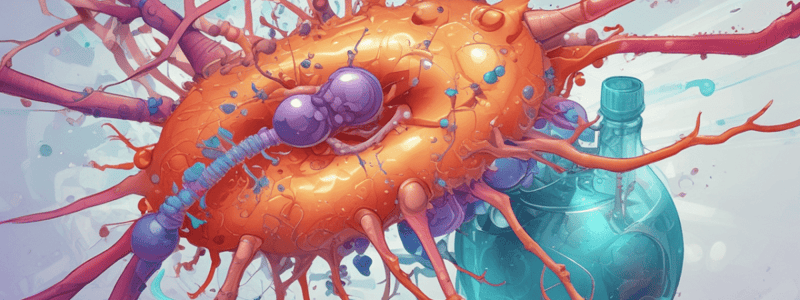Podcast
Questions and Answers
What is the primary function of an adjuvant in an immune response?
What is the primary function of an adjuvant in an immune response?
- To reduce the dosage of the antigen required
- To prolong the persistence of the antigen in tissues (correct)
- To stimulate a response from T-cells
- To neutralize the antigen
What is the name of the microorganism commonly used in water-in-oil suspensions for vaccinations?
What is the name of the microorganism commonly used in water-in-oil suspensions for vaccinations?
- E. coli
- Salmonella
- Mycobacterium (correct)
- Streptococcus
What is the benefit of inoculating an animal at least twice?
What is the benefit of inoculating an animal at least twice?
- To elicit a secondary immune response (correct)
- To reduce the risk of adverse reactions
- To stimulate a primary immune response
- To induce tolerance to the antigen
What is the advantage of the subcutaneous route of inoculation?
What is the advantage of the subcutaneous route of inoculation?
What is the benefit of using an adjuvant in a vaccination?
What is the benefit of using an adjuvant in a vaccination?
What is one way adjuvants prolong the persistence of an antigen in tissues?
What is one way adjuvants prolong the persistence of an antigen in tissues?
What type of immune response is enhanced by co-stimulation of B cells?
What type of immune response is enhanced by co-stimulation of B cells?
Why is the intravenous route of inoculation useful in mice?
Why is the intravenous route of inoculation useful in mice?
What is the advantage of inoculating an animal via the subcutaneous route?
What is the advantage of inoculating an animal via the subcutaneous route?
What type of response is achieved by inoculating an animal at least twice?
What type of response is achieved by inoculating an animal at least twice?
Study Notes
Adjuvants in Antibody Response
- An adjuvant is used to promote antibody response to an antigen by prolonging its persistence in tissues and co-stimulating an immune response
- Adjuvants help to stimulate B cells to rush to the area, enhancing the immune response
- Examples of adjuvants include water in oil suspensions containing killed microbacterium, commonly used in vaccinations
Administration Routes for Adjuvants
- Intravenous (IV) administration involves direct injection into the blood, useful for monoclonal antibody production in mice
- Subcutaneous (SC) administration involves injection under the skin, which enters the lymph nodes
Best Practices for Immunization
- To achieve a secondary response, it is recommended to inoculate the animal at least twice
Adjuvants in Antibody Response
- An adjuvant is used to promote antibody response to an antigen by prolonging its persistence in tissues and co-stimulating an immune response
- Adjuvants help to stimulate B cells to rush to the area, enhancing the immune response
- Examples of adjuvants include water in oil suspensions containing killed microbacterium, commonly used in vaccinations
Administration Routes for Adjuvants
- Intravenous (IV) administration involves direct injection into the blood, useful for monoclonal antibody production in mice
- Subcutaneous (SC) administration involves injection under the skin, which enters the lymph nodes
Best Practices for Immunization
- To achieve a secondary response, it is recommended to inoculate the animal at least twice
Studying That Suits You
Use AI to generate personalized quizzes and flashcards to suit your learning preferences.
Description
Explore the role of adjuvants in promoting antibody response to antigens, including their mechanisms and routes of administration. Learn about co-stimulation and persistence in tissue.




